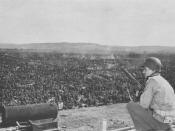John Misto's play 'The Shoe-Horn Sonata' is concerned with the incarceration of women and children while held captive in a prisoner of war camp by the Japanese. Misto uses this play not only to enlighten us to one of histories worst, yet least known, massacres but also to demonstrate the very essence of the human spirit, the will to survive. The play does this, not only through the dialogue of the text, but also through the music, visual slides/projections and general structure evident in the play. It is the combination of these devices which truly allows the essence of the human spirit to be evoked.
The most evident stimulant of the human spirit in the play is the dialogue of the three characters, Bridie, Sheila, and Rick. Together they evoke many aspects of the human spirit. In the opening scenes of the play lines in discussion such as "It's all in the mind" and "there's nothing wrong with my memory" foreshadow the mental ability of these women to withstand horrendous circumstances but at the same time be trapped in their own memories and minds.
The women also demonstrate the will to rise above physical status to a heightened level. Even when treated like "useless mouths" they found ways to make "this glorious sound that rose above the camp" and in turn "set us free". This ability to rise above a physical state reinforces the power and ability of our human spirit. The interviewer also plays an important role in the dialogue of the play. Rick's inquisitive nature shows the curious side of our spirit while his ability to stay insignificant allows the attention of the responder to be focused upon the women. Such seemingly unimportant questions as "And did it?" and "Why?" are common of Rick's character and allow the...


